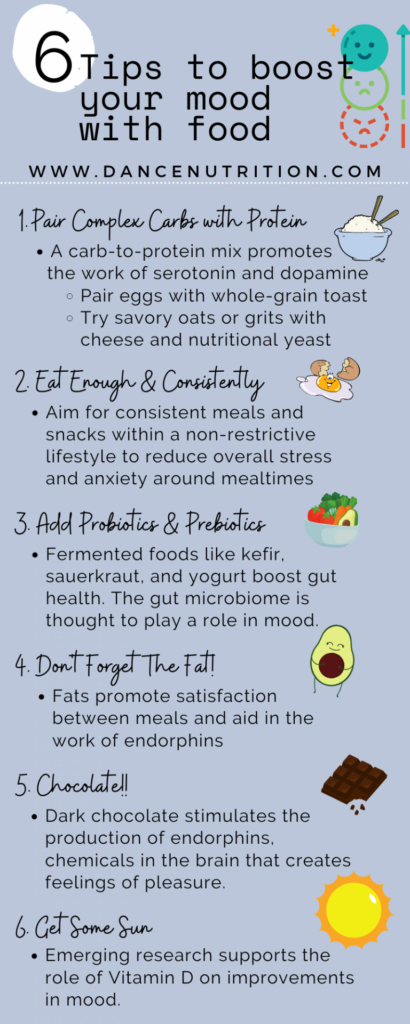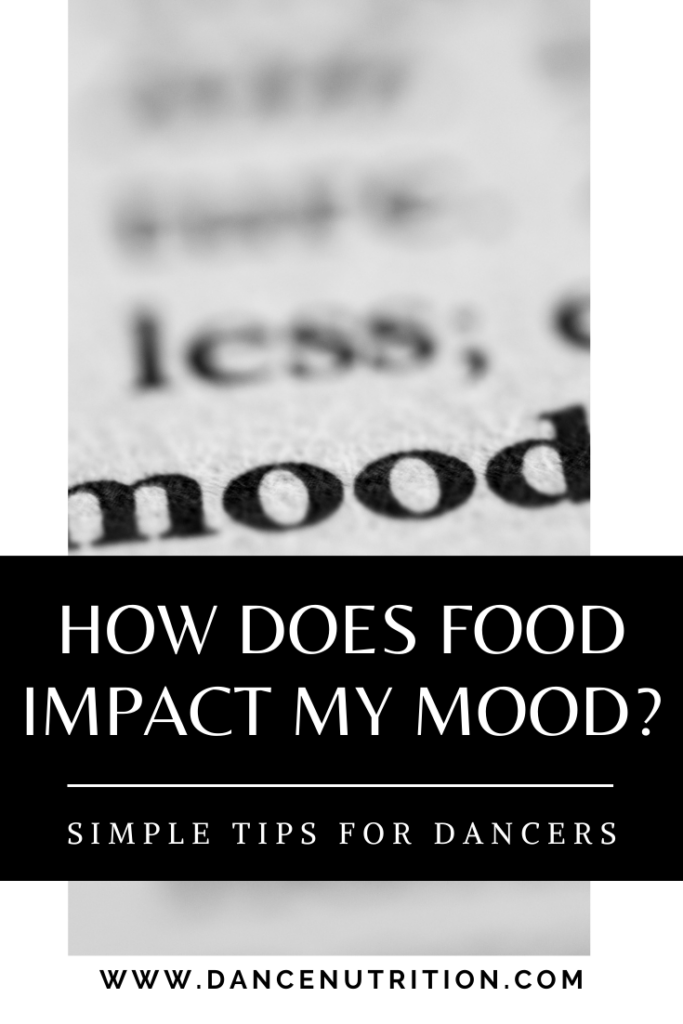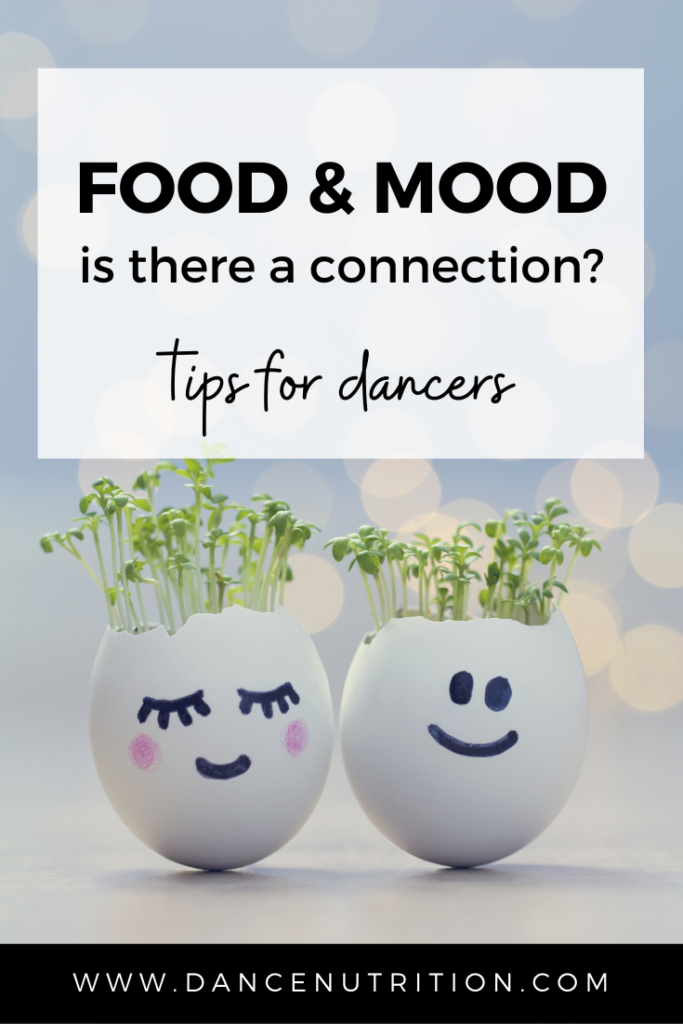Food provides the nutrients and energy our bodies need to function, but its influence extends beyond mere sustenance. Increasingly, research highlights the profound connection between what we eat and our mood— an interplay of nutrients, brain chemicals, and lifestyle factors that together support a functioning mindset. In this article, we’ll uncover how our food choices impact our moods and strategies dancers can implement to enhance the connection.
The Science Behind Food and Mood
Neurotransmitters are chemicals that communicate messages between the brain and body— a crucial connection regulating our thoughts, emotions, and behaviors. These neurotransmitters include serotonin, dopamine, and norepinephrine.
Serotonin: The Happy Hormone
Serotonin is pivotal in calmness and sleep. Approximately 95% of serotonin is produced in the lining of our gastrointestinal tract, suggesting a strong link between the gut and the brain— often called the gut-brain axis.
Serotonin is made from tryptophan, an amino acid in many protein-rich foods like chicken, turkey, eggs, cheese, nuts, seeds, and soy products.
Dopamine: The Reward
Dopamine is associated with pleasure and reward; it’s also responsible for the temporary sense of comfort gained while eating (particularly foods we enjoy). The release of dopamine occurs in response to a spectrum of behaviors from laughing and listening to music, to addictive behaviors like smoking and drinking (alcohol). Since there is a release of dopamine in response to eating, some believe there to be a parallel between food and addiction. However, laughing and listening to music aren’t addictive, right? Here are two articles that further debunk food addiction and sugar addiction.
Dopamine is synthesized from tyrosine, another amino acid found in foods like protein-rich foods like meats, fish, eggs, and dairy.
The Stress Hormones
Epinephrine and norepinephrine affect attention and responding actions— both are crucial for our fight-or-flight response. Tyrosine also plays a role in its production.
Endorphins
Often called natural pain relievers, endorphins are a group of neurochemicals released in response to pain or stress, improving mood and supporting a sense of well-being. They’re often associated with exercise and why you feel a sense of joy after an incredible class or performance. Highly palatable (tasty) foods rich in fat also support the production of endorphins a helpful contributor to feelings of satisfaction during and between meals.
Mood Decline: The impact of restrictive eating
Calorie deficits, particularly from skipping meals and restricting food, lead to many challenges that can negatively impact a dancer’s mood.
A lack of focus
Adequate fuel is necessary for focus. Not eating enough calories can leave you feeling foggy, confused, and rundown. Click here to read more about different foods that can help you focus.
A stressful relationship with food
Feelings of deprivation and recurring food guilt, both resulting from disordered eating, can elicit overwhelming mealtime stress. When under stress, the body amps the production of the hormone cortisol, among others. Increased cravings and appetite dysregulation often follow with susceptibility to emotional eating and eating past comfort.
There’s nothing inherently wrong with turning to food for comfort. As previously discussed, food can offer emotional support. However, that support will be temporary and for this reason, we want to build additional coping tools to navigate stressful periods. Working with a Registered Dietitian Nutritionist is encouraged for dancers who feel stuck in their relationship with food.
The Role of The Gut
The gut microbiome is a vast community of bacteria housed within our intestines. Regarding mental health, the idea is that psychobiotics are beneficial bacteria (probiotics) that support the gut-brain connection. These microbes produce the same neurotransmitters, such as serotonin and dopamine, that the brain does. A healthy, diverse gut microbiome is the goal. Click here to learn more about boosting your gut health.
Key Takeaways: 10+ tips to fuel a better mood
- Get more calories in if you’re under-eating.
- Eat regularly— consistent meals and snacks to reduce overall stress and anxiety around mealtimes.
- Including carbohydrates in your meals spares protein for the anabolic building of tissues and hormones. This indirectly supports the absorption and utilization of the amino acids tryptophan and tyrosine.
- Build meals and snacks upon a framework that includes fiber-rich complex carbs like oats, legumes, whole fruits, and starchy veggies to stabilize blood sugar and support the production of neurotransmitters.
- Add probiotic-rich foods like yogurt, kefir, sauerkraut, and other fermented products to support gut health. Prebiotic foods, such as garlic, onions, and bananas, feed the beneficial bacteria and help them thrive.
- Incorporate sources of fats throughout your day to stabilize hormones and promote adequate production of endorphins. Examples include nuts, seeds, avocadoes, butter, oils, and fatty fish.
- Enjoy dark chocolate to boost the production of endorphins.
- When feasible, partake in stress-reducing activities.
- Take measures (food and non-food) to support your vitamin D status. Here’s an article that will help.
- Incorporate omega-3 fatty acids from fatty fish like salmon and mackerel, flaxseeds, and walnuts into your day. Studies suggest they can help reduce symptoms of depression and anxiety.
- Add foods rich in folate, B6, and B12 to your day, examples include leafy greens, legumes, eggs, and meats are excellent sources. These nutrients are vital for brain health and the production of neurotransmitters.
- Foods rich in magnesium may also help and include dark chocolate, avocados, nuts, and whole grains.





